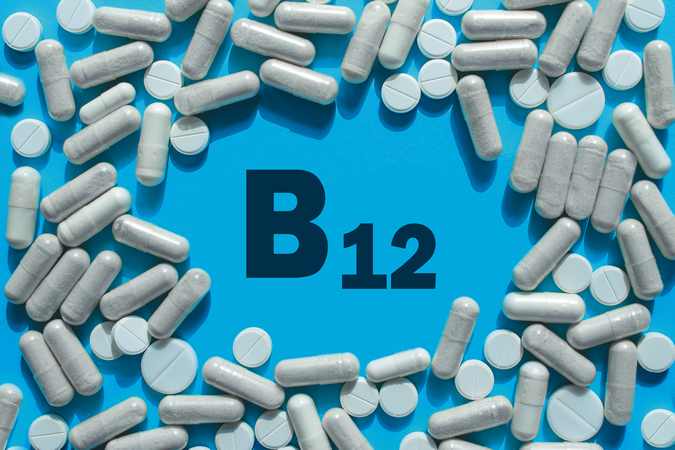Vitamin B12 plays many crucial roles in the body. It is involved in neurologic function, red blood cell production, DNA synthesis, and a number of important chemical reactions. Vitamin B12 deficiency, while not common, can cause megaloblastic anemia (a disorder of the red blood cells that can cause symptoms such as fatigue, pale skin, and lightheadedness) and neurological and cognitive disorders.
Consumption of animal products (like fish, meat, chicken, and dairy) and fortified foods (like breakfast cereals) generally provides plenty of B12 to meet our needs. Because plant foods like fruits, vegetables, and grains do not contain this vitamin, strict vegans should be conscious of their B12 intake. People who have had bariatric surgery or who have had part of their intestines removed, as well as those with absorptive disorders like inflammatory bowel disease, are also at increased risk for B12 deficiency. Additionally, the ability to digest and absorb B12 may decline with age. Now, long-term use of several common medications has been added to the list of reasons to monitor B12 status.

Metformin: Metformin, an oral diabetes medicine, is the first line of recommended drug treatment to help control blood sugar levels. “Metformin interferes with absorption of vitamin B12, so patients on metformin are at risk for vitamin B12 deficiency at about double the rate compared to patients not being treated with metformin,” says Anastassios G. Pittas, MD, MS, co-director of the Tufts Medical Center Diabetes and Lipid Center. “The longer the duration of metformin use, the higher the likelihood of developing vitamin B12 deficiency.” While protocols may vary by physician, Dr. Pittas checks blood vitamin B12 levels when an individual begins taking metformin, after one year, and every three years thereafter. “I check more often if there are additional risk factors (such as vegan diet or history of bariatric surgery),” says Pittas. He does not recommend taking vitamin B12 supplements unless blood tests show a deficiency but does recommend appropriate dietary calcium for all patients. “There is evidence that the interference of vitamin B12 absorption by metformin is a calcium-dependent process,” says Pittas. Getting the recommended amount of dietary calcium (1,000 milligrams a day for adults 19 to 50, and 1,200 milligrams for women over 50 and men over 70) from foods like dairy products, calcium-fortified orange juice and milk substitutes, almonds, and leafy greens may help protect metformin users from vitamin B12 deficiency.
Acid-lowering drugs: Acid-lowering drugs (proton pump inhibitors and H2-receptor antagonists) are commonly used to treat conditions associated with excess stomach acid production like gastroesophageal reflux (GERD), stomach ulcers, and indigestion. “Long-term administration of acid-suppressant drugs like ranitidine (Zantac) and cimetidine (Tagamet), and especially the more potent acid suppressors such as omeprazole (Prilosec), lansoprazole (Prevacid), and pantoprazole (Protonix), inhibit the absorption of vitamin B12,” says Joel B. Mason, MD, professor of nutrition at the Tufts Friedman School.
Vitamin B12 in food is bound to protein. “Stomach acid is required to release B12 from food so it can connect to the carriers which convey the vitamin into the body,” says Irwin H. Rosenberg, MD, professor emeritus at the Friedman School. Medications that lower stomach acid production may reduce the amount of B12 available for absorption. Over time, this could result in B12 deficiency.
Research suggests that, while absorption of vitamin B12 is significantly decreased shortly after treatment with acid suppressors begins, it can take more than a year before blood levels of B12 are significantly impacted, and these lower levels do not necessarily lead to health problems. The American Gastrointestinal Association states that there is no need for long-term users of proton pump inhibitors to routinely use B12 supplements, and routine screening and monitoring are not required. “Although the suppression of B12 absorption with these drugs may be mild enough to not cause a clinical deficiency by themselves, it is well worth remembering that if these drugs are administered in the presence of other risk factors for B12 deficiency—such as a vegan lifestyle or age over 60—the multiple factors may collectively conspire to cause a deficiency state,” says Mason.
If blood levels of vitamin B12 are low, the lowest effective supplement dose should be taken, and a doctor should reevaluate treatment periodically.
If you take metformin or acid-lowering drugs and have other risk factors like a vegan diet or a history of bariatric surgery, try these tips as a precaution against vitamin B12 deficiency:
-Ask your healthcare provider if there is any need to monitor your B12 levels.
-Tell your healthcare provider if you are a vegan or starting to follow a vegan diet, have gastrointestinal problems, or have a history of GI surgery, as these (along with age) are risk factors for B12 deficiency.
-Consume plenty of calcium-rich foodsespecially if you take metforminlike dairy products, calcium-fortified orange juice and milk substitutes, almonds, and leafy greens. All adults should aim for 1,000 to 1,200 milligrams of calcium from food a day.
-Do not take B12 supplements without advice from your healthcare provider, as very high doses have been associated with health risks.

























Hello to all
In this baffling continuously, I honey you all
Appreciate your strain and friends
The recommended RDA levels of B12 is 2-3 mcg per day. your magazine January 2020 newsbite front page article cited a JAMA 2018 study on hip fractures after falls in senior women over 30 years and the women who were taking high doses of B12 and B6 had 50% more hip fracture after falls than those who didn[t take excess.
I have since discovered an online company of supplements who are putting 5,000 mcg in a variety of their pills. This sounds criminal to me and I want to report them but feel like the federal agencies like FDH? etc are too swamped with covid for me to bother them with this. Stop Aging now.com
Hi, Emilie! I’m a Registered Dietitian and have an MS in Nutrition. I don’t know you, but love you for recognizing a possible issue and trying to call out a company.
B12 is a water-soluble vitamin, so it’s generally considered safe, even at high doses (it doesn’t have what’s called a “Tolerable Upper Intake Level”), so the excess would likely be excreted (peed out). Sadly, most consumers wouldn’t know this and think “if 2 mcg is good, 5000 mcg must be amazing” and then literally throw their money down the toilet.
I am concerned that your recommendations include calcium fortified orange juice. Why would you recommend orange juice to people taking Metformin to lower blood sugar? Please add a warning to those taking Metformin to only use calcium fortified orange juice on a doctor’s OK. Lots of other protein rich foods do not raise blood sugar!